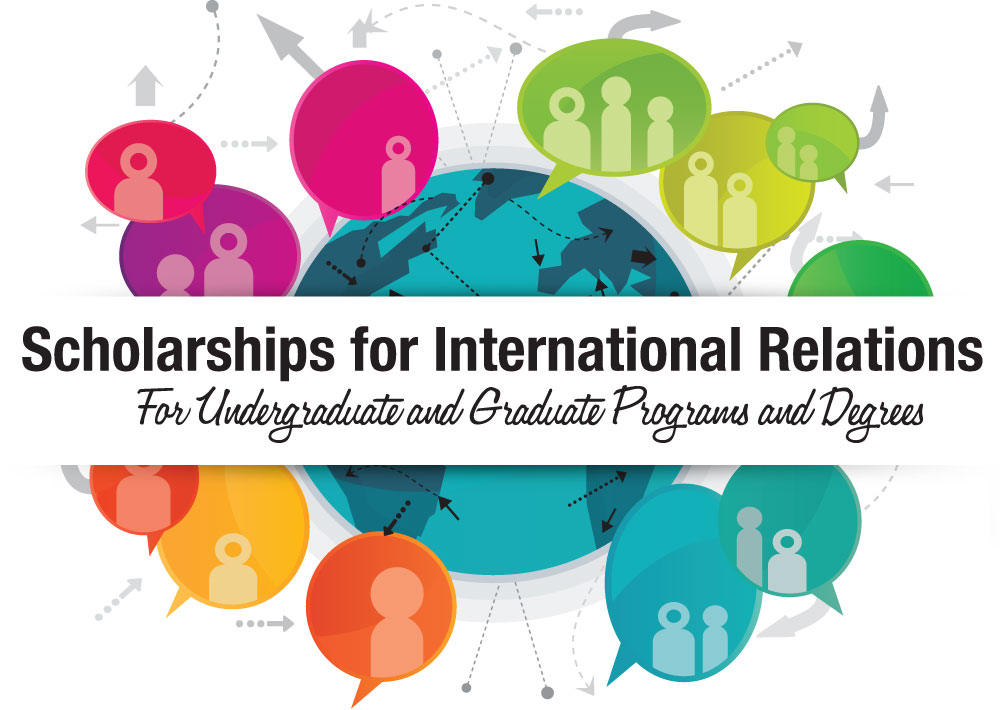From Dream to Diplomacy: My Journey to Securing an International Relations Scholarship
Hey there! If you’re reading this, chances are you have a spark inside you – a curiosity about the world, a desire to understand global issues, or maybe even a quiet dream of making a difference on an international stage. Believe me, I know that feeling. It’s the same one that nudged me, years ago, towards the fascinating world of International Relations.
But here’s the thing: dreams, especially big, global ones, often come with a hefty price tag. Studying abroad, getting a top-notch education in International Relations, or even pursuing a master’s or PhD in the field can feel financially out of reach. For a long time, I thought that too. I pictured those prestigious programs, the bustling campuses in foreign lands, and immediately thought, "Nope, not for me. Too expensive."
Then, a little voice inside me whispered, "What if? What if there’s another way?" And that, my friends, is where my journey into the world of International Relations scholarships truly began. Let me tell you how I navigated it, and hopefully, my story can light a path for yours.
My Own Leap of Faith: The "Impossible" Dream
I remember sitting in my small room, laptop open, scrolling through university websites. The programs sounded incredible – modules on global security, international law, human rights, and diplomacy. My heart yearned for it, but my wallet screamed "No way!" Every tuition fee listed felt like a brick wall.
I genuinely believed that scholarships were only for the absolute geniuses, the valedictorians, or people with connections I didn’t have. It felt like a secret club I wasn’t invited to. But one afternoon, after a particularly disheartening search, I typed "fully funded international relations scholarships" into Google, almost out of desperation.
What came up wasn’t a magic wand, but it was a start. It was a dizzying array of links, forums, and official websites. It was overwhelming, yes, but it also showed me something crucial: these opportunities exist. They weren’t a myth. They were real, and people like me were getting them.
Why Pursue International Relations? And Why Fund It?
Before we dive into the nitty-gritty of the hunt, let’s take a quick detour. Why is International Relations such a vital field, and why do so many organizations, governments, and universities invest in future IR professionals through scholarships?
Think about it: our world is more interconnected than ever. Conflicts in one region affect economies globally. Climate change doesn’t respect borders. Pandemics spread like wildfire. To navigate these complex challenges, we need smart, compassionate, and well-trained individuals who understand diplomacy, global governance, economics, and cultural nuances.
International Relations scholarships aren’t just charity; they’re an investment. An investment in building bridges, fostering peace, understanding diverse perspectives, and solving the grand challenges of our time. When you apply for one, you’re not just asking for money; you’re presenting yourself as a potential solution-maker, someone worth investing in.
The Scholarship Hunt: Where to Begin?
Okay, let’s get practical. The sheer volume of information can be paralyzing. My advice? Start broad, then narrow your focus.
-
University Websites are Goldmines: Almost every university offering an International Relations master’s or undergraduate program will have a "Scholarships" or "Financial Aid" section. Don’t just look for general university scholarships; specifically search for those tied to your department (e.g., "Faculty of Social Sciences Scholarships," "IR Department Bursaries"). Often, these are less competitive because they’re specialized.
-
Government-Sponsored Programs: These are often the holy grail – fully funded scholarships that cover tuition, living expenses, flights, and sometimes even a stipend. Think about programs like:
- Chevening Scholarships (UK): For future leaders.
- Fulbright Scholarships (USA): Promoting cultural exchange.
- Erasmus Mundus Joint Master Degrees (Europe): Offers incredible opportunities to study in multiple European countries.
- DAAD Scholarships (Germany): For various fields, including IR.
- Many other countries (Canada, Australia, Japan, China, etc.) also have their own government-funded programs. Do your research based on your target country.
-
Non-Profit Organizations and Foundations: Many organizations are dedicated to promoting global understanding and peace. They offer scholarships for students pursuing related fields. Look for foundations focused on:
- Peace studies
- Human rights
- International development
- Regional studies (e.g., Asian studies, African studies)
-
Online Scholarship Databases: Websites like ScholarshipPortal, Fastweb, and even LinkedIn can be useful. Just remember to filter extensively using keywords like "International Relations," "global studies," "diplomacy," "political science," and your target degree level (e.g., "graduate scholarships").
My biggest tip here? Start early! Many deadlines are a year or more in advance of your program start date. I learned this the hard way, scrambling to gather documents. Don’t be me!
Decoding Scholarship Requirements: What They’re Really Looking For
Once you’ve found a few promising leads, it’s time to dig into the requirements. This is where you need to be strategic. Scholarships aren’t just about your grades; they’re about your story and your potential.
- Academic Merit: Yes, good grades matter. Most scholarships will ask for your transcripts. But "good" doesn’t always mean perfect. If your grades aren’t stellar, focus on showcasing improvement, specific achievements, or extracurriculars that compensate.
- Essays/Personal Statements: This is your chance to shine! This isn’t just a summary of your CV. It’s where you tell why you want to study International Relations, what you hope to achieve, and how this specific scholarship will help you get there.
- Letters of Recommendation (LORs): Choose professors or supervisors who know you well and can speak to your academic abilities, work ethic, and suitability for an IR program. Brief them on the scholarship’s focus and what aspects of your character/work you want them to highlight.
- CV/Resume: Tailor it for each application. Emphasize experiences related to IR – volunteering, internships, leadership roles, research projects, even relevant club activities.
- Language Proficiency: If you’re studying in a non-native language, expect to submit TOEFL or IELTS scores.
- Specific Criteria: Pay close attention to unique requirements. Some scholarships target specific nationalities, gender, socio-economic backgrounds, or areas of interest within IR (e.g., conflict resolution, environmental policy).
Crafting a Winning Application: My Secrets (and Mistakes!)
This is where the rubber meets the road. Applying for scholarships is a skill, and it gets better with practice.
-
The Essay is Your Voice:
- Be Authentic: Don’t try to sound like someone you’re not. Share your genuine passion.
- Tell a Story: Instead of just listing achievements, weave them into a narrative. "I volunteered at X, which showed me Y, leading to my interest in Z."
- Connect the Dots: Explicitly link your past experiences, your current aspirations, and how the International Relations program and scholarship will bridge that gap.
- Show, Don’t Just Tell: Instead of saying, "I’m passionate about human rights," describe an experience where you advocated for human rights or researched a relevant issue.
- Research the Scholarship/University: Mention specific professors, courses, or research centers that excite you. This shows you’ve done your homework and aren’t sending generic applications.
My mistake: My first few essays were too formal, too academic, and lacked personality. They sounded like a textbook. It wasn’t until I started pouring myself into the words that I saw a shift.
-
Choose Your Recommenders Wisely:
- Don’t just pick the most senior person. Pick someone who knows your work intimately and can write a glowing, specific letter.
- Provide them with your CV, personal statement draft, and a clear list of what you’d like them to highlight. Make their job easy!
-
Proofread, Proofread, Proofread:
- A sloppy application can sink your chances, no matter how brilliant your ideas.
- Read it aloud. Ask a friend or mentor to review it for typos, grammatical errors, and clarity.
- Double-check all dates, names, and program titles.
-
Quality Over Quantity (Eventually): In the beginning, apply to many. But as you get closer to deadlines, focus your energy on a few applications that you can truly tailor and perfect. Sending out 50 generic applications is less effective than sending 5 highly personalized, well-researched ones.
The Waiting Game and What Comes Next
Ah, the infamous waiting game. This is often the hardest part. You’ve poured your heart and soul into applications, and now… silence.
- Prepare for Rejection: It’s a part of the process. I received many "we regret to inform you" emails. Each one stung a little, but it also fueled my determination. Learn from it, if possible, and move on. Don’t let it define you.
- Celebrate the Small Wins: Even an interview invitation is a huge step!
- The Golden Email: When that acceptance email finally landed in my inbox, the one offering a fully funded International Relations scholarship, I literally jumped out of my chair. It felt surreal. All those late nights, all that doubt, suddenly evaporated.
Once you secure a scholarship, there’s still work to do:
- Accept the Offer: Confirm your acceptance promptly.
- Visa Process: This can be complex and time-consuming. Start early!
- Logistics: Accommodation, flights, insurance, budgeting. The university or scholarship provider will usually offer guidance.
My Final Thoughts and Encouragement
Looking back, my journey to securing an International Relations scholarship wasn’t a straight line. It was full of twists, turns, moments of doubt, and exhilarating breakthroughs. But if there’s one thing I want you to take away from my story, it’s this: it is absolutely possible.
Your dream of studying International Relations, of contributing to global understanding, or of pursuing a career in diplomacy, is valid and achievable. Don’t let the financial barrier be the thing that stops you.
Believe in your story. Believe in your potential. Do your research meticulously, craft your applications with passion and precision, and be resilient in the face of setbacks. The world needs your voice, your ideas, and your unique perspective. Go out there and find that scholarship; your future in international relations awaits!



